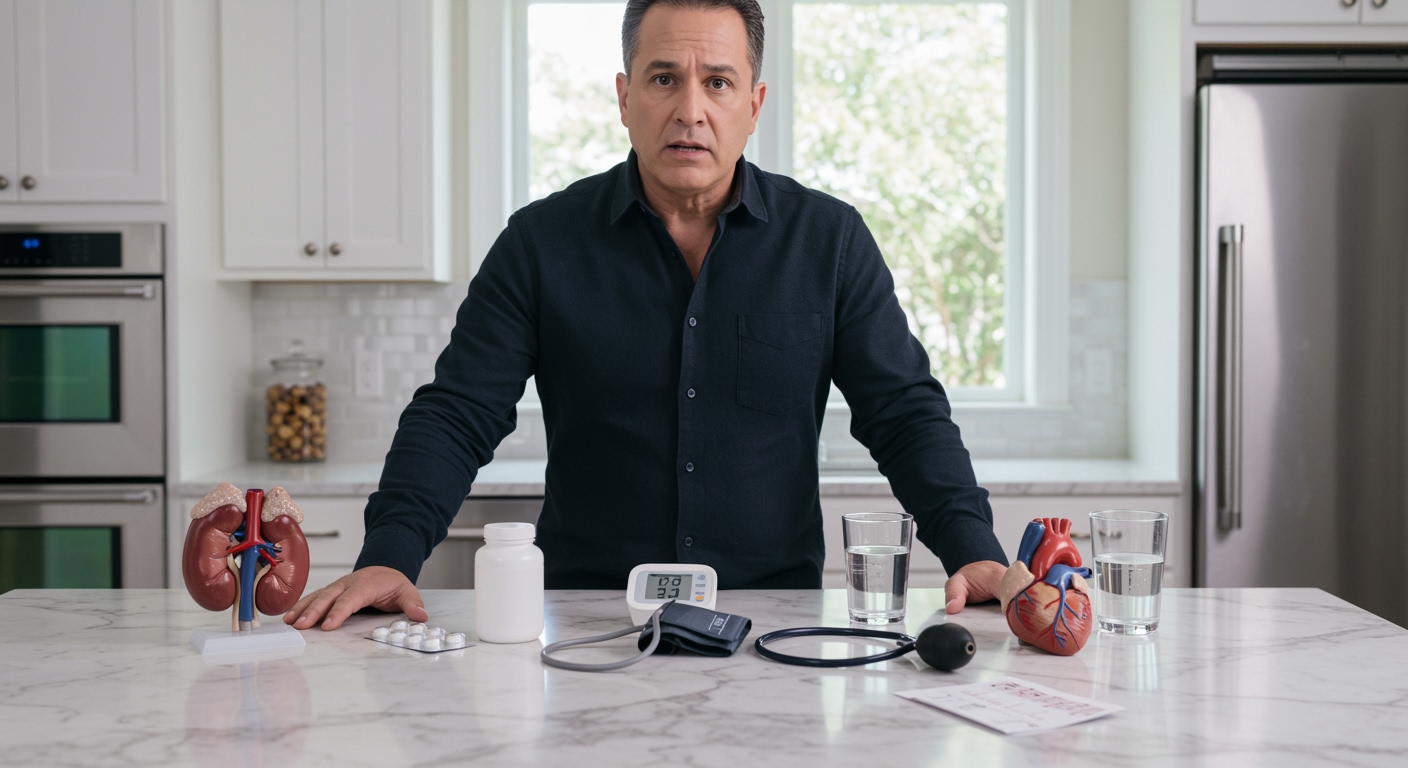✪ Key Highlight: Kidney deaths from high blood pressure surged 48% over 25 years, with Black Americans facing triple the risk of other groups.
Introduction
Your blood pressure numbers might seem like just routine medical data, but new research reveals they could be predicting a deadly outcome.
A groundbreaking study presented at the American Heart Association’s Hypertension Scientific Sessions shows that kidney deaths from high blood pressure have jumped by an alarming 48 percent in the United States over the past 25 years.
Hi, I’m Abdur, your nutrition coach and today I’m going to analyze this shocking research that exposes how uncontrolled hypertension is silently destroying kidneys across America.
What Does This Research Actually Show?
Dr. Joiven Nyongbella from Wayne State University led a team that analyzed 25 years of national death data from the CDC.
Between 1999 and 2023, hypertensive renal disease caused 274,667 deaths in Americans aged 15 years and older.
The age-adjusted mortality rate climbed from 3.3 to 4.91 deaths per 100,000 people.
This represents an average annual increase of 1.51 percent, which compounds into devastating numbers over decades.
Hypertensive renal disease occurs when chronic high blood pressure damages the tiny blood vessels in your kidneys.
Your kidneys filter waste and excess fluid from your blood through millions of microscopic filtering units called nephrons.
When blood pressure stays elevated, it creates excessive force against these delicate structures, causing scarring and permanent damage.
✪ Fact: High blood pressure is the second leading cause of end-stage kidney disease in America.
Why Are Men Dying More Than Women?
The research revealed significant gender differences in kidney death rates from high blood pressure.
Men showed a mean age-adjusted mortality rate of 4.48 deaths per 100,000 compared to 3.69 for women.
The risk became even more pronounced when kidney disease progressed to renal failure.
Men with renal failure faced a 22 percent higher death risk compared to women with the same condition.
However, in cases without renal failure, the gender gap disappeared completely.
This pattern suggests that men either develop more severe kidney damage or receive delayed treatment for their hypertension.
Men traditionally avoid regular medical checkups and often ignore early warning signs of health problems.
✪ Pro Tip: Men should prioritize annual blood pressure screenings starting at age 30 to catch problems early.
What About The Shocking Racial Disparities?
The most disturbing finding involves the massive racial gap in kidney death rates.
Black individuals had more than three times the death rate compared to other racial groups.
Their mean age-adjusted mortality rate reached 10.37 deaths per 100,000 versus 3.33 to 3.90 in other groups.
Dr. Nyongbella noted that despite national efforts to reduce health inequalities, these disparities persist.
Hispanic individuals also faced elevated risk with a 15 percent higher age-adjusted mortality rate than non-Hispanics.
These differences stem from complex factors including genetic predisposition, socioeconomic barriers, and healthcare access.
Black Americans have higher rates of diabetes and obesity, which compound the kidney-damaging effects of high blood pressure.
✪ Note: Structural racism in healthcare contributes significantly to these persistent health disparities.
Which Regions Face The Highest Risk?
Geography plays a crucial role in determining your risk of dying from hypertensive kidney disease.
The Western United States showed the highest overall age-adjusted mortality rates.
However, the three states with the absolute highest rates were Washington D.C., Tennessee, and Mississippi.
All three locations are in the South, suggesting regional factors beyond simple geography.
These areas often have limited access to specialized kidney care and fewer preventive health programs.
Economic factors also influence outcomes, as people in these regions may delay seeking treatment due to cost concerns.
Local food environments rich in processed, high-sodium foods contribute to both hypertension and kidney damage.
✪ Fact: The Southern diet pattern significantly increases hypertension risk through high sodium and processed food intake.
What Makes This A Global Health Crisis?
This American trend reflects a much larger worldwide problem with hypertension-related kidney deaths.
Global deaths from chronic kidney disease increased by 24 percent from 1990 to 2021 according to American Heart Association statistics.
A study in BMC Nephrology reported that mortality from chronic kidney disease due to hypertension claimed over 454,000 lives worldwide.
The global burden measured in disability-adjusted life years rose from 4.34 million in 1990 to 10.85 million in 2021.
This represents a staggering 149.74 percent increase in just three decades.
Only about 20 percent of people with hypertension worldwide reach target blood pressure levels.
Many people never receive timely treatment for complications, allowing kidney damage to progress silently until it becomes irreversible.
✪ Pro Tip: Regular blood pressure monitoring at home can catch dangerous spikes before they cause permanent kidney damage.
The Bottom Line
This research exposes a preventable health crisis that demands immediate action from individuals, healthcare systems, and policymakers.
Your blood pressure today determines your kidney health tomorrow, and waiting for symptoms means waiting too long.
Share your thoughts about this alarming trend in the comments below, and let me know if you have questions about protecting your kidneys from high blood pressure damage.
References
At NutritionCrown, we use quality and credible sources to ensure our content is accurate and trustworthy. Below are the sources referenced in creating this article:
- News Medical: Study shows sharp increase in kidney disease deaths linked to high blood pressure
- American Heart Association: Deaths from high blood pressure related kidney disease up nearly 50 in the past 25 years
- PMC: Hypertensive kidney disease research
- Frontiers in Public Health: Global burden of hypertensive kidney disease
- NIDDK: Kidney disease health statistics





